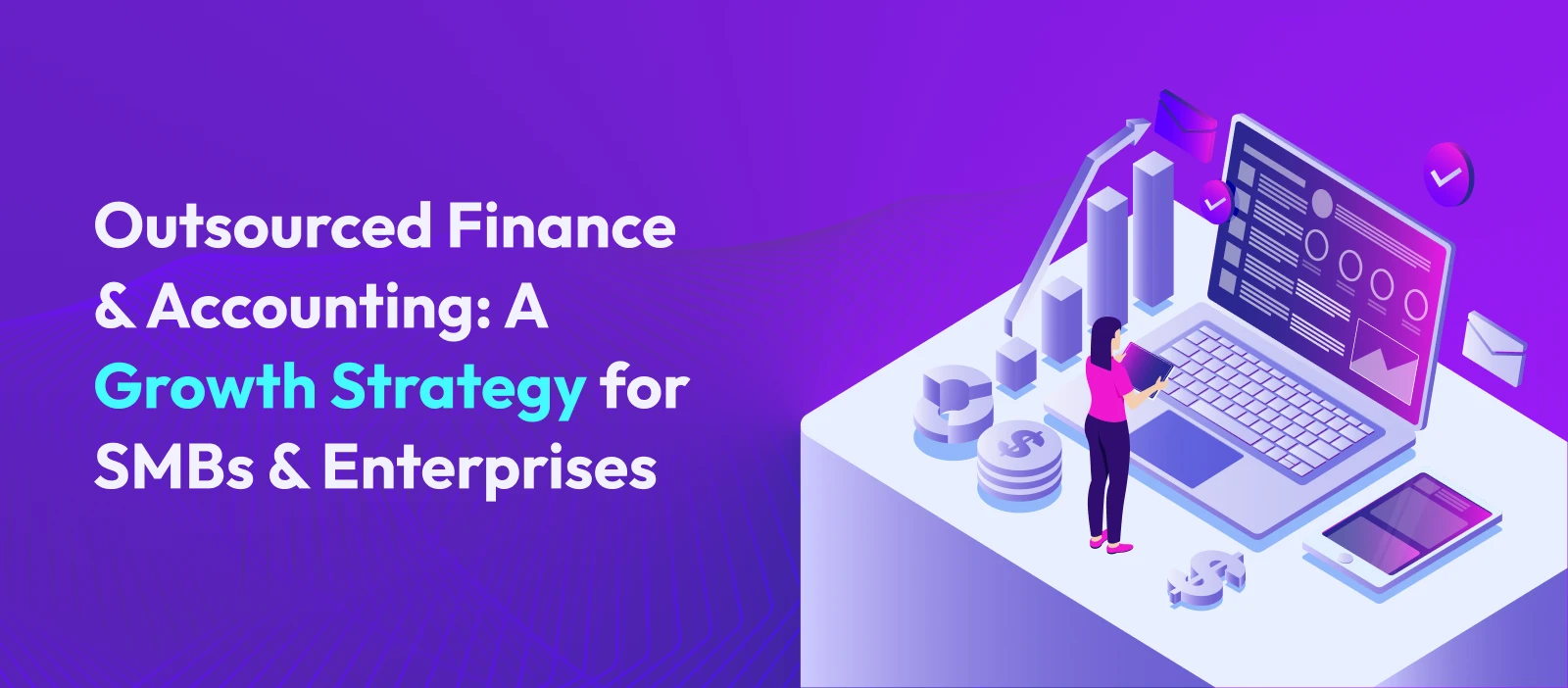Outsourced Finance & Accounting: A Growth Strategy for SMBs & Enterprises
September 25, 2025

Your finance team might be holding back your growth. That sounds harsh. But let’s understand why.
Many SMBs and enterprises get stuck in what is called the “finance trap.” They’re growing fast, revenue is climbing, but they’re drowning in spreadsheets, struggling with month-end closes that take forever, and their leadership team is spending more time on accounting than actual strategy. Does that ring a bell?
So, what are forward-thinking companies doing? They are turning to outsourced finance and accounting, which isn’t just a cost-cutting move anymore. It’s become a legitimate growth strategy for many companies.
And here’s the twist—while you’re debating whether to hire that $120K controller or upgrade your accounting software again, your competitors are already three steps ahead. Your competitors are leveraging outsourced accounting services to scale faster and smarter than you thought possible.
Now let’s understand why this shift is happening and how you can leverage it to scale your business.
The Case Against In-House Finance Teams
Okay, let’s talk about the elephant in the room. Building an in-house finance team sounds ideal: control, direct oversight, and the reassurance of having “your people” handle your money. But the hidden costs go far beyond salaries.
A skilled controller may cost $80K–$120K annually. Add benefits, software licenses ($200–$500/month), training, equipment, office space, and inevitable replacement costs—and the real expense quickly multiplies. Filling key positions can take months, even over a year, leaving your books in disarray and growth opportunities slipping away.
Then there’s expertise. Your in-house accountant may handle bookkeeping well, but what about international tax compliance, complex equity structures, or mergers? Specialized knowledge is hard to find and even harder to retain.
Traditional in-house accounting vs. outsourced bookkeeping misses the point: it’s not about choosing one over the other. It’s about choosing what truly accelerates your business.
Many in-house teams become bottlenecks during critical growth phases. While they manage routine operations effectively, rapid scaling, market shifts, or complex transactions often require agility and expertise beyond their reach.
Outsourced finance providers, on the other hand, handle these challenges every day across multiple clients. They bring experience, tools, and specialized knowledge—ensuring your finances support growth instead of slowing it down.
What is Outsourced Finance & Accounting?
Outsourced Finance & Accounting refers to the practice of delegating some or all financial management and accounting functions of a business to an external service provider.
Finance and accounting outsourcing isn’t about shipping your books to some overseas call center where nobody understands your business. Modern outsourcing looks completely different.
They are a team of professionals who will work for your company. One can get access to bookkeepers, controllers, CFOs, tax specialists, and compliance experts. All working together as an extension entity of your team.
How does it work? A managed finance solutions provider takes over specific functions—such as monthly bookkeeping and financial reporting. They align with your systems and processes to deliver the exact outputs you need: monthly profit and loss statements, cash flow reports, board packages, tax filings, and more—ensuring your business runs smoothly
The best finance BPO providers aren’t just processing transactions. They provide strategic insights, flag potential risks early, and guide better financial decisions.
Why SMBs & Enterprises are Moving to Outsourced Finance
Outsourcing finance is no longer about cost-cutting; it is about unlocking growth. Companies are realizing that with the right finance partner, their finance function becomes a strategic advantage rather than a back-office burden.
The shift is happening for four major reasons. Here’s how Terralogic’s finance and accounting services help
From reactive to proactive
Instead of waiting for weeks for month-end closes, Terralogic delivers real-time financial insights powered by automation and AI So, the leadership team makes decisions before the opportunity slips away.
From local to global
When businesses outsource, they get access to specialized expertise, allowing them to grow from local to global. Terralogic’s fintech solution helps such businesses with multi-currency, cross-border compliance, and global tax regulation.
Access to such tech and expertise gives you an edge over the in-house team and competitors.
From spreadsheet to strategy
Automated reconciliations, predictive cash flow, and AI-driven forecasting mean fewer errors, fewer late nights, and more bandwidth for innovation.
From Cost Center to Growth Driver
Finance isn’t just about keeping the books; it’s a growth engine. Outsourcing reduces fixed overhead and frees internal teams to focus on scaling, investments, and new opportunities.
Here are two stories that show how outsourced finance creates real impact:
Story 1: Tech Startup Scaling Fast
A growing tech startup faced delays and errors from its in-house bookkeeping. By outsourcing to a scalable accounting partner, the startup achieved the following:
- 30% faster time-to-market for product features
- 2x growth in the first year of outsourcing
- Stronger investor confidence through transparent financial reporting
With finance off their plate, founders could focus fully on innovation.
Story 2: SMBs Boosting Efficiency
A survey showed 37% of SMBs outsource their entire accounting function to cut costs and gain expert insights. The results? Owners reported:
- Less time spent on bookkeeping
- Better efficiency in financial processes
- More time to focus on scaling their business
Outsourcing didn’t just reduce burden—it gave SMBs back their focus.
How to Choose the Right Outsourced F&A Partner

You’re convinced outsourcing finance and accounting is the right move. The next step? Here’s a framework for evaluating the best outsourced finance and accounting providers:
Industry Expertise
If you’re in a specialized industry, don’t go for a generalist. Saas companies require precise revenue recognition, e-commerce firms need strong inventory management, and professional services face complex cash flow cycles.
Ask potential providers about their direct experience in your industry and request references from similar clients
Technology Integration
Your outsourced partner should integrate seamlessly with your existing systems, not force you to overhaul them.
The best third-party accounting providers are platform-agnostic and can work with whatever tools you’re already using.
Compliance Track Record
Accuracy and compliance are non-negotiable. Inquire about their quality control processes, historical error rates, and how they handle inevitable mistakes.
A good provider will have robust review processes and professional liability insurance.
Scalability Planning
Your provider should be able to scale with your business. Consider what happens when your revenue doubles. When will you expand internationally? When do you need specialized services?
The last thing you want is to outgrow your provider and have to switch again in 18 months.
Communication Style
This might be the most important factor. You need to feel comfortable asking questions and confident that they understand your business priorities.
If the sales process feels transactional or impersonal, the working relationship is unlikely to improve.
The Future of Outsourced Finance & Accounting
The future of outsourced finance and accounting is being shaped by advanced digital accounting services that leverage AI, automation, and machine learning, driving efficiency, accuracy, and predictive insights. Cloud platforms enable real-time reporting, giving businesses instant visibility for faster, data-driven decisions.
As security and compliance demands grow, remote accounting services are evolving from routine bookkeeping to strategic roles—budgeting, forecasting, and industry-specific financial planning. This shift ensures businesses gain not only accuracy and efficiency but also long-term financial clarity and resilience.
By combining technology with human expertise, outsourced F&A will continue to provide scalable, secure, and strategic financial management for SMBs and enterprises alike.
Conclusion
Trusting someone else with your finances can feel daunting. But after observing hundreds of companies make this transition, one thing is clear: the real risk isn’t outsourcing your finance function—it’s trying to manage everything in-house instead of focusing on what drives growth.
Today, outsourced finance and accounting isn’t just about cost savings; it’s a strategic advantage. While competitors struggle with hiring, training, and managing finance teams, you gain access to expert resources that scale alongside your business.
The most successful companies aren’t always the ones with the biggest budgets or the best products—they’re the ones that concentrate on what matters most while trusting experts to handle the rest.
Your next phase of growth is waiting. The question is, will you spend it managing spreadsheets or building your business?
FAQs
Q: How much does outsourced finance and accounting typically cost?
It varies widely based on scope, but most SMBs pay $2,000-$8,000/month for comprehensive services. That’s typically 50-70% less than equivalent in-house teams when you factor in salaries, benefits, and overhead.
Q: Will I lose control of my financial data?
Not with reputable providers. You maintain complete access to your data, often with better visibility than you’d have with in-house teams. Most providers use cloud-based systems that give you real-time access to everything.
Q: How long does it take to transition to an outsourced provider?
Most transitions take 30-60 days. The best providers have structured onboarding processes that minimize disruption to your operations.
Q: What if my business is too complex for outsourcing?
Complexity is actually an argument FOR outsourcing, not against it. Complex businesses need specialized expertise that’s expensive to maintain in-house. Outsourced providers handle complex scenarios across multiple clients daily.
Q: Can outsourced providers handle strategic financial planning?
Absolutely. Many providers offer virtual CFO services that include strategic planning, budgeting, scenario modeling, and board-level financial advisory services.
Q: What happens if I’m not satisfied with the service?
Most reputable providers offer 30-90 day trial periods and month-to-month contracts. Unlike employees, you can usually end the relationship quickly if it’s not working out.
Keep reading about
LEAVE A COMMENT
We really appreciate your interest in our ideas. Feel free to share anything that comes to your mind.
Our 16 years of achievements includes:
-
10M+
lines of codes
-
2400+
projects completed
-
900+
satisfied clients
-
16+
countries served




